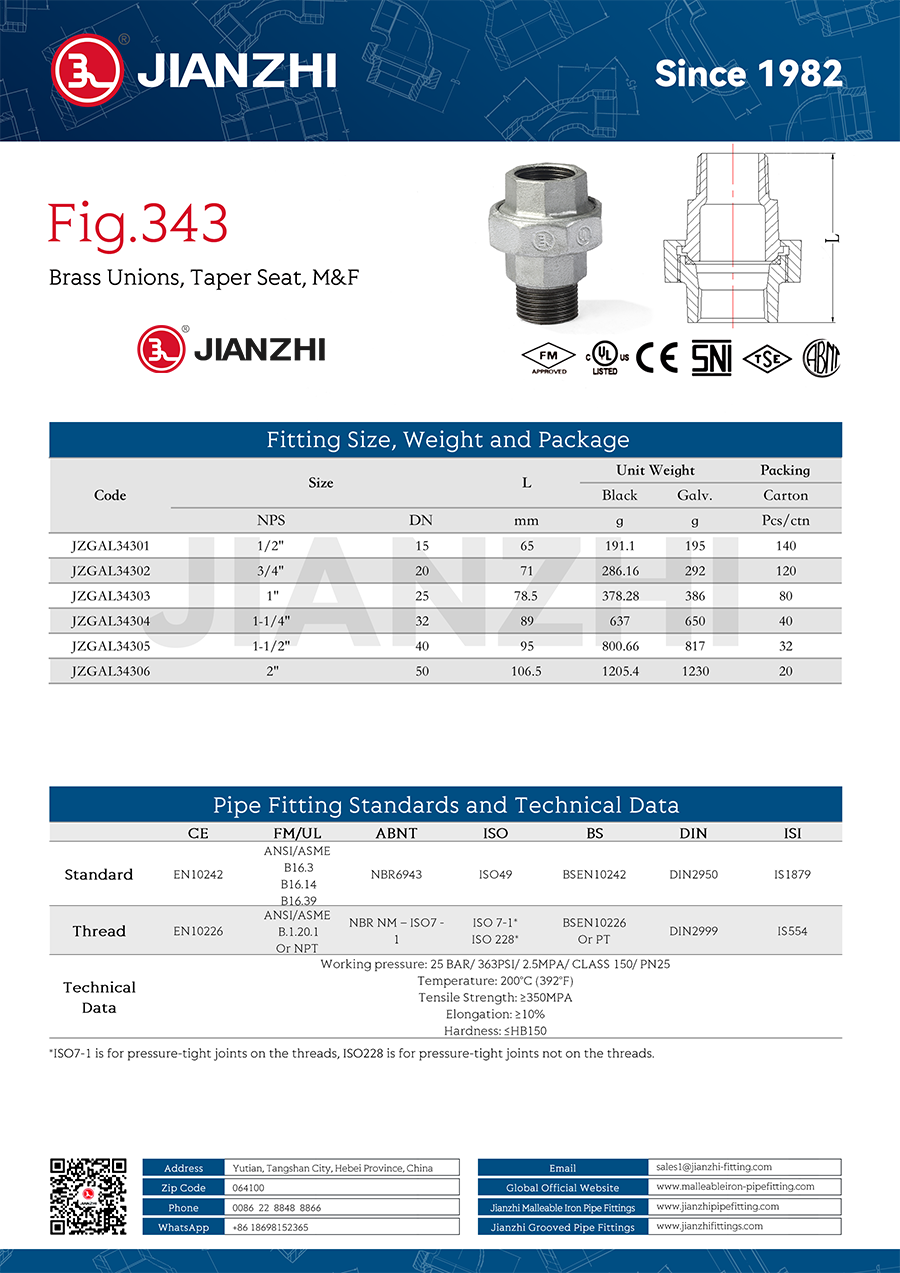Size: 1/8''-6''(DN6-DN150)
Standard: EN10242 / ANSI / ASME B16.3 / DIN2950 / IS0 49 / NBR6943 / IS1879 / BS EN10242
Threaded Standard: EN10226 / ASME B.1.20.1 / DIN2999 / ISO7-1 / ISO228 / IS554 / BS EN10226
Work Pressures: PN25 / 2.5Mpa / 363PSI /CLASS 150 / 30Bar
UL Listed /FM Approved /CE /ABNT /TSE /SNI /ISI

Product Description
Maximum Pressure: 25 BAR (363PSI) (2.5MPA) CLASS 150
Maximum Temperature: 200°C (392°F)
Tensile Strength: 350MPA
Hardness: HB150 (Brinell)
Elongation Rate: 15%
Suitable Applications: Water, Oil, Gas, Petro-Chemical
Material: Malleable Iron
When we talk about pipe fittings, it means that fittings are used to connect two or more pipes in two ways—either by threads or by slip fit. While metal pipes are threaded, the plastic pipe can be threaded or slip fit. A threaded pipe has screw-threaded ends for assembly or they screw together to connect.
For pipe thread sizes, “½–14 NPT” identifies a pipe thread with a nominal inside diameter of ½ inch and 14 threads to the inch, and these threads are made according to the NPT standard. The pipe has a left-hand thread if “LH” is added. The pipe thread standards followed in the US are:
NPT: American Standard Pipe Taper Thread
NPSC: American Standard Straight Coupling Pipe Thread
NPTR: American Standard Taper Railing Pipe Thread
NPSM: American Standard Straight Mechanical Pipe Thread
NPSL: American Standard Straight Locknut Pipe Thread
The word “taper” mentioned above refers to the difference between many pipe threads and those on bolts and screws. Pipe threads not only a make mechanical joint but also a leak-proof one. To do this, the threads become shallower the farther they are from the end of the fitting or the pipe. The bottoms of the threads taper. The taper is 1/16 inch in an inch.

Because of the taper, a pipe can only screw into a pipe fitting a little distance before it jams. The standard represents this distance, the effective thread. The standard also represents another distance, the engagement, which is the distance the pipe can be screwed in by hand, without much effort. For workers, it is easier to know how many turns to make by hand or with a wrench.
Types of threads:
Various threads available in pipe and pipe fittings are as follows:
Right-handed or Left-handed Threads
Nearly all threads are oriented so that a bolt or nut or any fitting can be tightened. By turning it in a clockwise direction, the item turned moves away from the viewer. And it is loosened by turning anticlockwise when the item moves towards the viewer. This is known as a right-handed thread. Left-handed threads are oriented in the opposite direction. There are also self-tapping screw threads where no nut or bolt is required.
Pipe Threads
Male Threads
In male threads, the threads of the pipe are on the outside. Here, tapered pipe threads like NPT, BSPT, etc. are used for sealing without gaskets.
Female Threads
In female threads, the threads are on the inside. Here too, like male threads, tapered pipe threads are used for sealing.
Male Straight Thread
Pipe threads like UNC, UNF, ASME, etc form Male Straight Thread.
Female Straight Thread
Straight pipe threads like UNC, UNF, ASME, etc.
Plain End
This is used to connect or insert into the bell end of the connecting pipe.
Bell / Socket / Flare
This represents the end length of increased diameter into which a pipe end can be fitted.
Flange
Flanges are used to connect fitting, via bolting or welding. There are basically two types of flanges, circular and square.
Compression Fitting
This represents a compression nut and ferrule to connect to a mating pipe.
Pipe Clamp End
It is so designed so as to attached to run on the pipe or other fittings.
Barb / Rib
This represents fitting ends to connect only non-rigid pipe or hose. It is sometimes used with a clamped end.
Groove
This refers to the installation of a coupling feature like an o-ring or elastomeric seal.
Product Dimensions

SAFER
PRODUCT INFO
ABOUT JIANZHI
TECH DATA
Contact Us
E-mail: sales1@jianzhi-fitting.com
Tel: +86 18698027872
Office In Tianjin:
Heping District, Tianjin, China.
Production Base 1:
Chifeng, Inner Mongolia, China.
Production Base 2:
Tangshan City, Hebei Province, China.
Production Base 3:
Schelei Street,Baicoi City,Prahova County,Romania
Service email: info.ro@jianzhi-fitting.com
Sales email: market.ro@jianzhi-fitting.com
Tel: +40(755)011 849
